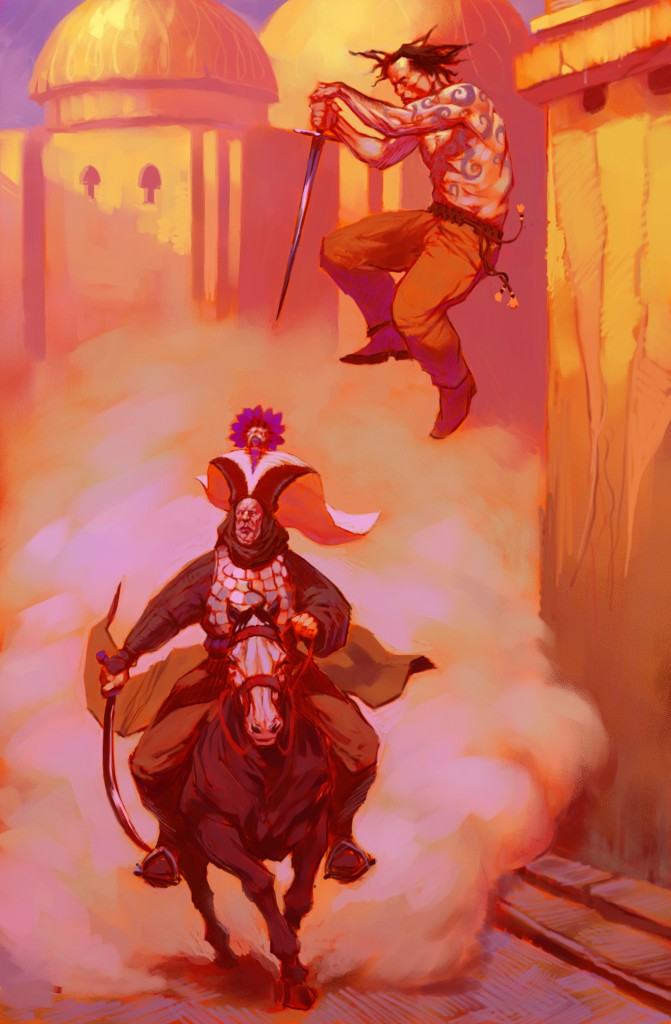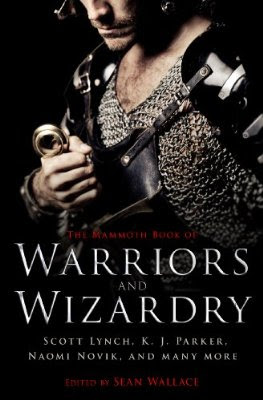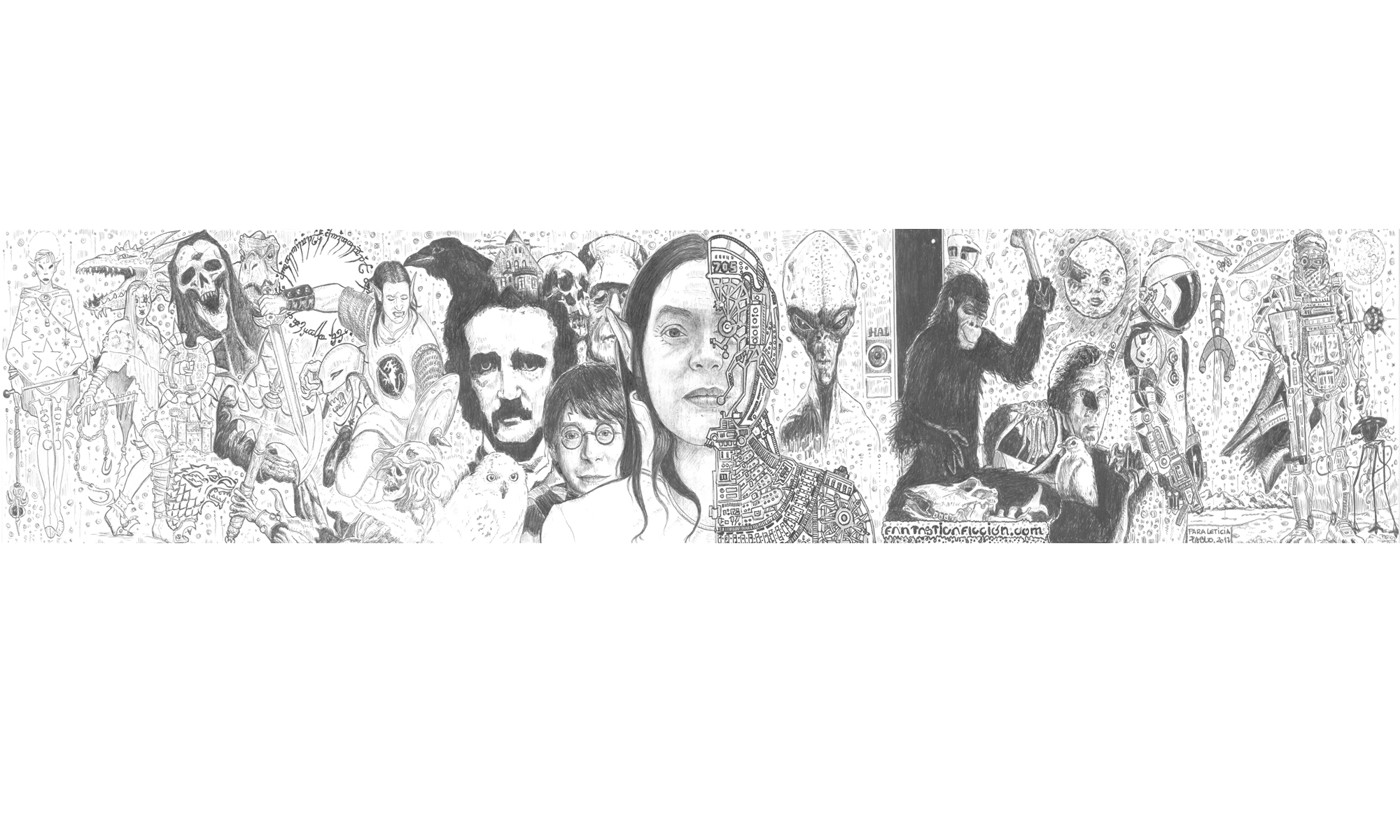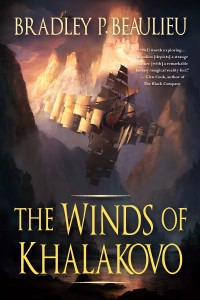 El autor Bradley P. Beaulieu (del que ya reseñamos un libro aquí y del que puedes leer una historia aquí) ha respondido amablemente a unas preguntas que le hemos hecho desde Fantástica Ficción. Os animamos a leer su trilogía Lays of Anuskaya y los nuevos proyectos en los que se ha embarcado. (Puedes leer esta entrada en inglés)
El autor Bradley P. Beaulieu (del que ya reseñamos un libro aquí y del que puedes leer una historia aquí) ha respondido amablemente a unas preguntas que le hemos hecho desde Fantástica Ficción. Os animamos a leer su trilogía Lays of Anuskaya y los nuevos proyectos en los que se ha embarcado. (Puedes leer esta entrada en inglés)
¿Cuándo supiste que querías ser escritor? ¿Qué otros autores te han influído? ¿Cómo te documentas? ¿Por qué escogiste el entorno ruso para tu trilogía?
Empecé a escribir bastante tarde. Hice mis pinitos en el instituto y en la universidad, pero no lo tomé en serio hasta los treinta años, cuando empecé a ir a varias convenciones, talleres y conferencias. Pero siempre me ha gustado la fantasía. Realmente nunca leí mucho fuera del género, pero siempre me he sentido atraído por las fantasías con grandes mundos secundarios como El señor de los anillos, la Dragonlace, Thomas Covenant y la trilogía Coldfire.
En un principio, di con el sabor ruso de la novela por casualidad. Estaba trabajando muy duro en la construcción del mundo. Sabía que quería que las islas fueran frías e inhóspitas y también sabía que no quería el típico escenario europeo medieval porque, aunque he leído muchas de estas historias y me han gustado, no era algo que quisiera explorar en esta historia. Quería algo nuevo, pero también que no fuera completamente extraño para el lector de fantasía épica. La Rusia moscovita parecía interesante y exótica y me daba el ambiente “frío e inhóspito” del que hablaba antes. Y una vez probado, me gustó mucho y se convirtió en parte inseparable de la historia.
¿Cómo compaginas tu trabajo y la escritura?
No es fácil, te lo puedo asegurar. Normalmente me reservo una hora para escribir. En ese tiempo puedo alcanzar las 1000 palabras, unas cuatro páginas. Es suficiente para terminar una novela al año, que es mi objetivo en este momento en mi carrera. Si pudiera dedicarme a tiempo completo, creo que podría escribir dos libros al año. Pero hasta entonces, concentro mis esfuerzos, escribiendo las palabras, cuando los niños duermen.
El otro tema que está acaparando cada vez más tiempo desde que salió “The Winds of Khalakovo” es el marketing y la publicidad. Exige mucho tiempo e incluso puede no dejarme escribir, pero trato de ser muy diligente con mi tiempo de escritura, ya que si no lo hago no conseguiré terminar los libros a tiempo y esto sería un desastre mayor que retrasar entradas del blog o no poder organizar el regalo de libros que quería llevar a cabo.
También he empezado el podcast Speculate! con Gregory Wilson, algo que también consume tiempo. Es un balance muy delicado porque me niego a perder el contacto con mi familia. Tengo dos hijos, de 3 y 7 años y no voy a perderme su infancia. Y también quiero pasar algo de tiempo con mi mujer. Así que hacer malabarismos con todas estas cosas es difícil. Pero los días siguen pasando y mantengo la mayoría de las bolas en el aire.
¿Qué significó para tí ganar Writers of the Future Award?
Fue un gran punto de inflexión para mí. El Writers of the Future Award está bien considerado en la comunidad de ficción especulativa, y ganarlo es un auténtico honor. Quizá más que el premio en sí mismo, lo que más disfruté fue el taller al que asisten los ganadores. Volé a Hollywood, California para pasar una semana con Tim Powers, K.D. Wentworth y otros ganadores y finalistas. Fue una estancia maravillosa y establecí amistades que aún mantengo. Conocí a Jay Lake, Sean Williams, Jerry Pournelle, Anne McCaffrey y Todd McCaffrey y algunos ilustradores también. Nunca lo olvidaré.
¿Cómo ha sido tu experiencia con la autopublicación? ¿El futuro de los autores es volverse híbrido? ¿Crees que trabajar en cosas como la maquetación resta tiempo que podrías dedicar a tu obra?
Ha sido un auténtico ajetreo recorrer la ruta de la autopublicación para mi antología y el tercer libro de mi trilogía. Tiene sus recompensas porque el autor tiene control completo sobre todo. Mientras tengas cuidado de crear un producto de calidad, las recompensas pueden ser incluso mayores que en la publicación tradicional porque llevas la batuta en todas las decisiones en vez de ser solo el escritor (y ocasionalmente el vendedor).
El lado malo, por supuesto, es que quita mucho tiempo. Como tú dices, me aleja de escribir, y éste ha sido un efecto secundario desafortunado (aunque no inesperado). Es algo que todos los escritores deben tener en cuenta, porque hay que equilibrar el tiempo que se emplea en sacar el libro o la colección adelante y el tiempo que se dedica a escribir un nuevo libro. Es un gran coste de oportunidad y cada escritor deberá sopesarlo detenidamente.
Pero por lo general, creo que cada vez más escritores escogerán la ruta híbrida. Existen ciertos tipos de proyectos que se ajustan bien a la autopublicación. Las colecciones de relatos cortos son un buen ejemplo. No son superventas para las editoriales, así que muchos escritores las sacarán por su cuenta. La fantasía científica y otras novelas crossover también son buenos ejemplos, porque hay tipos de historias que las editoriales no saben como publicitar y es posible que no te lleguen ofertas o que no cumplan tus expectativas, así que decidas autopublicarte.
¿Cómo trabajas con los ilustradores?
He disfrutado mucho trabajando con Evgeni Maloshenkov en las ilustraciones interiores para mis libros. Mi labor ha sido como director artístico. Le mandaba a Evgeni un art brief, que incluía un extracto de la novela, una descripción de la escena que quería que se dibujara y algunas fotos de referencia que buscaba por internet. Entonces Evgeni me respondía con un bosquejo inicial, sobre el que yo haría comentarios. Este proceso seguiría atrás y hacia delante hasta que Evgeni creaba la ilustración final y yo daría los últimos toques.
Ha sido muy divertido escoger mis propias escenas y que Evgeni las ilustrara. Ha sido un esfuerzo colaborativo que ha dado lugar a algunas ilustraciones maravillosas.
Aquí hay algunos ejemplos:
http://quillings.com/2013/05/22/fourth-art-reveal-for-the-lays-of-anuskaya-jump/
http://quillings.com/2013/03/02/story-collection-update-plus-new-interior-art-reveals/

¿Has contactado con alguna editorial española para traducir tu obra?
No he hablado con ningún editor español pero me encantaría conseguir nuevos lectores en España y en el mundo. ¡Ojalá pronto!
¿Qué puedes decirnos de tus nuevos proyectos?
The Song of the Shattered Sands es una nueva trilogía que he vendido a DAW Books en los EE.UU. y a Gollancz en el Reino Unido. Es una historia sobre una luchadora incansable que se rebela y cuestiona el mando en Twelve Kings of Sharakhai. Transcurre en un escenario que es una reinvención de las Mil y una noches repleto de barcos de arena, dioses caprichosos y aliados intrigantes. Llevo dos tercios del primer libro, y estoy muy excitado con la historia. Es un cambio para mí, porque estoy centrándome en un solo punto de vista. Es fantasía épica, sólo que contada a través de la voz de una mujer que desea vengar a su madre y a su gente.
¿Las redes sociales son importantes para tus relaciones con otros autores y con tus lectores?
Absolutamente. No sé dónde estaría hoy sin las redes sociales. He conocido a gente fantástica, incluida tú, a través de ellas. Reseñadores, lectores, fans, podcasters, blogueros y más. No empecé con una base de fans, así que ha sido importante utilizar las redes sociales para que corriera la voz. Me alegra que existan. No puedo imaginar cómo se las apañaban los escritores antes.
¿Qué respuesta ha tenido tu artículo en el blog de John Scalzi sobre la relación entre tu trilogía y la situación política actual?
Estoy sorprendido porque no ha tenido mucha repercusión. Creo que es un fenómeno interesante, como la ficción refleja los valores tradicionales y los acontecimientos de nuestros tiempos. Todos somos criaturas del mundo y la era en que vivimos. Se pueden ver tendencias en la ficción que sigue a los grandes hitos de la historia como las guerras mundiales, la gran depresión, la revolución industrial o la guerra fría. Es interesante también cómo la literatura puede establecer un diálogo consigo misma cuando las obras se escriben en respuesta a otras obras, cuando el péndulo de la opinión se balancea adelante y atrás en varios temas. Una de las cosas más interesantes sobre la literatura es que es a la vez un espejo de nuestro tiempo y un formador de opinión.
¿De dónde salió la idea para Speculate!?¿Cómo escogéis los libros de los que habláis?
Gregory Wilson y yo hablamos en un World Fantasy en Columbus, Ohio en 2010. No tenía nada que ver con un podcast. Era sobre una obra de ficción, “Spar” de Kij Johnson, para ser exactos. Compartimos nuestros pensamientos sobre ella y fue una conversación tan divertida que Greg empezó a hablar de ello como una idea para un podcast, pensó que nuestra esgrima verbal se podría acomodar bien a un podcast.
Ha resultado ser muy divertido y me ha permitido conocer a muchos grandes autores con los que podría no haber sido capaz de hablar en profundidad, y espero que también sea divertido para nuestros fans. Normalmente escogemos las novelas o historias que queremos leer o que la gente cree que son interesantes en el género. También aceptamos sugerencias de los fans. Lauren Beukes es un ejemplo de una recomendación de un fan, que va a aparecer muy pronto.
¿Crees que tus talentos culinarios se reflejan en tu obra?
Bueno, intento crear platos interesantes en mis mundos.Y ha sido divertido investigar sobre las técnicas de cocina de varias culturas, sus recetas tradicionales, sus bebidas (alcohólicas o no), sus postres, las costumbres construídas alrededor de la comida y demás. La comida es una de las piedras angulares de cualquier sociedad civilizada. Revela mucho acerca de ellos y de su mundo. Las especias que utilizan y su precio relativo puede mostrar dónde estaba situada esa sociedad en particular respecto a las rutas de comercio. La comida está íntimamente relacionada con los ritos religiosos, y puede revelar cosas sobre estas creencias. Los alimentos básicos muestran a menudo en qué tipo de tierra viven, en la costa, la montaña o el desierto. Las implicaciones de la comida son muchas más y de mayor calado de lo que la gente cree.
Así que ha sido un viaje interesante y divertido imaginar la comida que pertenece a una historia junto con la propia historia. Es algo que creo que siempre incluiré en mis relatos, porque me gusta mucho la cocina y su historia.
Quiero reiterar mi agradecimiento a Brad por dedicarnos su valioso tiempo en esta entrevista, con autores así da gusto.
 Sean Wallace es el editor de esta antología sobre guerreros y magia en la que hay autores muy interesantes, como los que entrevistamos Aliette de Bodard, Bradley P. Beaulieu y Yoon Ha Lee o figuras importantes como Benjanun Sriduangkaew o Scott Lynch.
Sean Wallace es el editor de esta antología sobre guerreros y magia en la que hay autores muy interesantes, como los que entrevistamos Aliette de Bodard, Bradley P. Beaulieu y Yoon Ha Lee o figuras importantes como Benjanun Sriduangkaew o Scott Lynch.



